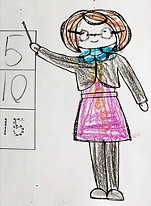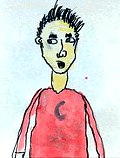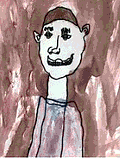The surprise exam
Preface
 This was written in 2009. I explain why I think the surprise exam paradox is just a subtle version of the paradox of the heap. This was not easy to figure out because this is one of the most confusing paradoxes in the world.
This was written in 2009. I explain why I think the surprise exam paradox is just a subtle version of the paradox of the heap. This was not easy to figure out because this is one of the most confusing paradoxes in the world.
 This was written in 2009. I explain why I think the surprise exam paradox is just a subtle version of the paradox of the heap. This was not easy to figure out because this is one of the most confusing paradoxes in the world.
This was written in 2009. I explain why I think the surprise exam paradox is just a subtle version of the paradox of the heap. This was not easy to figure out because this is one of the most confusing paradoxes in the world.
3. A better reading
To make better sense of the student’s logic, it is necessary to distinguish these two statements:These statements are not equivalent because the first could be true without the second being true, e.g., if the teacher simply keeps mum about the upcoming exam.
Notice, however, that the reverse is not possible. If the second were true, then the first would have to be true too, since, as a rule, you can’t know that something is true unless it is true.
This is where the student’s logic comes in, for if we consider his reasoning a little more carefully, we will find his essential contention to be this: if we start by accepting that the second statement is true, then, amazingly, we will be able to deduce that the first statement is false!
That would be absurd, of course, but the immediate point is that the student is not accusing the first statement of being false in itself, but only conditional on the second statement’s being true.
This explains how he can so blithely presume that the class knows that the surprise exam will occur in the apparent course of arguing that it cannot occur – he isn’t really arguing that the surprise exam cannot occur, but is rather entertaining a “reductio ad absurdum” of the supposition that the class knows that it will occur. His point is that this supposition leads to an absurdity and must therefore be rejected.
Once we see this, the paradox takes on a very different light.
Far from being seen to be challenging the first statement below, the student is seen to be challenging the second one instead:At any rate, he is making out a tension between the two statements. If his logic is right, then if the second statement is true, the first is compelled to be false, which, as mentioned, is absurd. So either his logic is flawed or else we must conclude, on pain of absurdity, that the second statement cannot be true, after all. But at no stage of the argument does the first statement ever come under threat.
Admittedly, it is not natural to view the student as trying to perform a reductio ad absurdum of the second statement. Nobody thinks of this upon encountering the paradox but there is a good reason for it. It is because hardly anyone would question the truth of the second statement (any more than the first) in the situation at hand.
Thus, everyone agrees that the surprise exam can occur, but most people accept further that the class can know that it will occur, e.g., on the word of the teacher. This is something like common sense.
From this point of view, the assumed truth of 2) is harmless and so some flaw must exist in the student’s logic which purports to extract the falsehood of 1) from the assumed truth of 2). Since the logic looks suspicious, attention is drawn to it at once and the assumed truth of 2) is quickly overlooked.
That said, notice that the cost of finding no flaw in the student’s logic is not the rejection of 1), which would be unthinkable, but only the rejection of 2), which a minority of people would actually be prepared to entertain. So it is not entirely out of the question that the student’s logic contains no flaw.
My own opinion, however, is that both 1) and 2) should be conceded to be true and therefore some flaw must exist in the student’s logic. This opinion is widely shared among those who distinguish clearly between 1) and 2).
So the way in which the paradox is normally raised can be slightly misleading.
At first sight, the student seems to be arguing that the surprise exam cannot occur, but careful reflection shows that, if he manages to establish anything, it is only that the class cannot know that it will occur.
Later, we shall see that one common account of the “flaw” in his reasoning falls short of the target because of unclarity on this point.
For the moment, let us absorb the point in a slightly different way by putting ourselves directly in the student’s shoes. Let’s meet Lennart Ekbom, the Swedish mathematician who first stumbled upon this paradox while listening to a national media broadcast during the second world war.
To make better sense of the student’s logic, it is necessary to distinguish these two statements:
1) The surprise exam will occur.
2) The class knows that the surprise exam will occur.
Notice, however, that the reverse is not possible. If the second were true, then the first would have to be true too, since, as a rule, you can’t know that something is true unless it is true.
This is where the student’s logic comes in, for if we consider his reasoning a little more carefully, we will find his essential contention to be this: if we start by accepting that the second statement is true, then, amazingly, we will be able to deduce that the first statement is false!
That would be absurd, of course, but the immediate point is that the student is not accusing the first statement of being false in itself, but only conditional on the second statement’s being true.
This explains how he can so blithely presume that the class knows that the surprise exam will occur in the apparent course of arguing that it cannot occur – he isn’t really arguing that the surprise exam cannot occur, but is rather entertaining a “reductio ad absurdum” of the supposition that the class knows that it will occur. His point is that this supposition leads to an absurdity and must therefore be rejected.
Once we see this, the paradox takes on a very different light.
Far from being seen to be challenging the first statement below, the student is seen to be challenging the second one instead:
1) The surprise exam will occur.
2) The class knows that the surprise exam will occur.
Admittedly, it is not natural to view the student as trying to perform a reductio ad absurdum of the second statement. Nobody thinks of this upon encountering the paradox but there is a good reason for it. It is because hardly anyone would question the truth of the second statement (any more than the first) in the situation at hand.
Thus, everyone agrees that the surprise exam can occur, but most people accept further that the class can know that it will occur, e.g., on the word of the teacher. This is something like common sense.
From this point of view, the assumed truth of 2) is harmless and so some flaw must exist in the student’s logic which purports to extract the falsehood of 1) from the assumed truth of 2). Since the logic looks suspicious, attention is drawn to it at once and the assumed truth of 2) is quickly overlooked.
That said, notice that the cost of finding no flaw in the student’s logic is not the rejection of 1), which would be unthinkable, but only the rejection of 2), which a minority of people would actually be prepared to entertain. So it is not entirely out of the question that the student’s logic contains no flaw.
My own opinion, however, is that both 1) and 2) should be conceded to be true and therefore some flaw must exist in the student’s logic. This opinion is widely shared among those who distinguish clearly between 1) and 2).
So the way in which the paradox is normally raised can be slightly misleading.
At first sight, the student seems to be arguing that the surprise exam cannot occur, but careful reflection shows that, if he manages to establish anything, it is only that the class cannot know that it will occur.
Later, we shall see that one common account of the “flaw” in his reasoning falls short of the target because of unclarity on this point.
For the moment, let us absorb the point in a slightly different way by putting ourselves directly in the student’s shoes. Let’s meet Lennart Ekbom, the Swedish mathematician who first stumbled upon this paradox while listening to a national media broadcast during the second world war.
Menu
 What’s a logical paradox?
What’s a logical paradox? Achilles & the tortoise
Achilles & the tortoise The surprise exam
The surprise exam Newcomb’s problem
Newcomb’s problem Newcomb’s problem (sassy version)
Newcomb’s problem (sassy version) Seeing and being
Seeing and being Logic test!
Logic test! Philosophers say the strangest things
Philosophers say the strangest things Favourite puzzles
Favourite puzzles Books on consciousness
Books on consciousness Philosophy videos
Philosophy videos Phinteresting
Phinteresting Philosopher biographies
Philosopher biographies Philosopher birthdays
Philosopher birthdays Draft
Draftbarang 2009-2024  wayback machine
wayback machine
 wayback machine
wayback machine
 Paradox Lost (1971), by Ian Stewart.
Paradox Lost (1971), by Ian Stewart.


